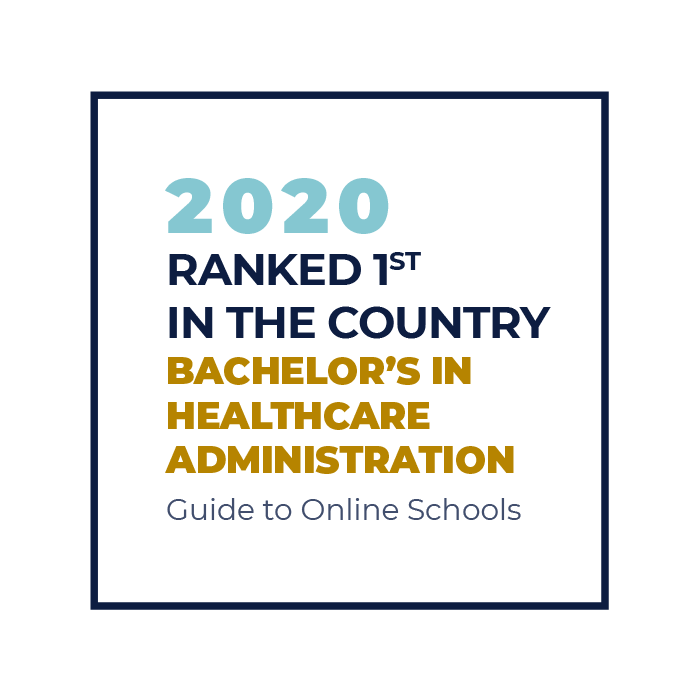Degree Title
Bachelor of Health Services Administration
Fall 2024 Start Date:
August 26, 2024
Spring 2025 Start Date:
January 6, 2025
Overview
Our fully online Bachelor of Health Services Administration qualifies graduates for entry-level management positions in a variety of
FIU's BHSA program is one of the largest undergraduate health services administration programs in the
The Bachelor of Health Services Administration program is an Associate Member of the Association of University Programs in Health Administration (AUPHA.org). AUPHA offers several scholarships and awards that the students may be eligible to apply for. Additionally, AUPHA offers the Bugbee-Falk Award that each member program will be eligible to award on a rotating basis. Additional information on prizes, awards, and webinars made available to students is provided at the following link: https://www.aupha.org/resourcecenter/currentstudents

-
Why Apply?
A Bachelor in Health Services Administration is a pathway to career advancement and provides an opportunity to make a significant contribution to healthcare organizations and the increasingly multicultural communities in which they serve and work. Job opportunities for graduates with a Bachelor of Health Services Administration (BHSA) degree include management positions in hospitals, long-term care facilities, health insurance, rehabilitation centers, private medical practices, non-profit healthcare, community agencies, and acute care healthcare systems.
The demand for health services and medical managers is expected to grow by 23% between 2012 and 2022. Fueling this growth is the need for managers who can monitor rising healthcare costs, retain employees and recruit new ones, transfer and maintain digital patient records and implement new technologies. Hospitals, which employed 39% of the 315,000 medical and health services managers in 2012, were the top employer, but there are new opportunities in nursing care facilities and offices of healthcare practitioners and medical group practices. (Occupational Handbook, Bureau of Labor Statistics)
-
Courses
A total of 120 credit hours are required for the Bachelor of Health Services Administration. Students must complete 60 credit hours of lower division University Core Curriculum (including pre-requisite courses) and 60 credit hours of
upper division coursework that consists of foundation courses, core courses, integrative coursesand electives.
Pre-Requisite
-
The Health Services Administration program requires successful completion of pre-requisite courses prior to enrolling in core courses. Students must complete the following pre-requisite courses as part of their 60 credit-hours of lower-division course work and achieve a minimum “C“ required grade in any one course.
-
Principles of
Microeconomics ECO 2023 -
Accounting for Decisions ACG 2021 OR Accounting for Managers and Investors ACG 3024
-
Accounting for Planning and Control ACG 3301
-
Introduction to Microcomputers CGS 2060
-
Statistics for Health Professions STA 3145 OR Statistics for Business and Economics STA 2023 OR Introduction to Statistics I STA 2122 OR Statistics I STA 3111.
Foundation Courses:
Foundation courses are pre-requisites to core courses.
Student must earn a “C” or higher to count towards the online BHSA degree (18 credit hours):Introduction to Health Services Systems HSA 3111
Students examine the history and current functions of health and social services delivery systems in the United States.Focus is on the components, their interaction, and internal/external controls.Leadership and Management for Health Professionals HSA 3180
This course introduces students to an overview of the basics of leadership and management with an emphasis on the roles, functions, and skills necessary in the changinghealth care environment.
Prerequisites: HSA 3111(corequisite)Values, Ethics, and Conflict Resolution in Health and Urban Affairs HSA 4431
Explores individual and organizational values, related values, related theories, ethical systems and their influence onbehavior of individuals in government agencies, law enforcement, andhealth care professions.Cultural Competency in Health Sciences HSA 3412C
Focus on selected systems of beliefs and values of cultural groups to develop cultural competence to minimize barriers in healthcare.
Prerequisite or co-requisite HSA 3111Communication Theory and Practice for Health Professions HSC 3661
Theory and practice of effective communication forhealth care professionals. Emphasis on communication between healthcare provider-client; provider-provider; provider-family.
Prerequisite or Co-requisite: HSA 3111Students must choose one of the 3 courses below:
-
Professional and Technical Writing ENC 3213
-
Business and Professional Communication COM 3110
-
Communication Skills for Policy and Management PAD 3438
Core Courses:
Students must complete the Core courses with a “C” or higher (15 credit hours):
Quality and Evidence-Based Healthcare Services HSA 4700
This course incorporates basic research methods, processes, and models in analyzing research studies and incorporating current quality standards and evidence-based protocols into healthcare.
Prerequisites: HSA 3111, HSA 3180, ENC 3213 or COM 3110 or PAD3438Communication and Information Technology for Healthcare Professionals HSA 4190
This online course assists the student in developing information and communication skills using the Internet. It demonstrates the use of technology in clinical practice, research and education.
Prerequisites: HSA 3180, HSC 3661Healthcare Financial Management HSA 4170
This course is an introduction to economics and financial management in diverse healthcare organizations.
Prerequisites: HSA 3111, HSA 3180, ECO 2023, ACG 2021/3024, ACG 3301, CGS 2060, and STA 2122 or STA 3111, or STA 3145, or STA 2023. This course requires department consent.Healthcare Organizational Behavior and Resource Management HSA 4110
This course is an analysis of organizational behavior and resource management, and the implications for leadership and management of healthcare systems.
Prerequisites: HSA 3111, HSA 3180Legal Aspects of Healthcare HSA 4421
Corporate structure and legal liabilities of health care institutions and professionalsis studied from a local, state, and federal regulatory position.
Prerequisites: HSA 3111, HSA 3180, ENC 3213 or COM 3110 or PAD 3438
Integrative Courses:
Students must complete the Integrative courses with a “C” or higher (12 credit hours):
Program Planning and Evaluation HSA 4140
Basic concepts of planning and evaluation as the fundamental tools of program design and development are examined.
Prerequisites: HSA 4421, HSA 4700Global Healthcare Systems and Policy HSA 4150
Develop basic knowledge of Global healthcare systems and policies including healthcare outcomes, evidence-based practices, sociopolitical systems, and roles of various healthcare providers.
Prerequisites: HSA 3412C, HSA 4431, HSA 4421, HSA 4700Health Management Systems Engineering HSA 4192
Develop and evaluate healthcare quality management techniques including work systems, job analysis, space utilization, inventory control, and operations management.
Prerequisites/Co-requisites: HSA 4700, HSA 4190, HSA 4170, HSA 4110, and HSA 4421Global Issues and Trends in Healthcare HSA 4113
Developing issues and trends involving global healthcare systems are analyzed to determine their impact on service, delivery, financing, quality measures, evidence-based practice, and accessibility.
Prerequisites: HSA 4431, HSA 3412C, HSC 3661, HSA 4170, HSA 4110, HSA4421, or department consent
Elective Courses:
Students must earn a “C” or higher to count towards the BHSA degree. Students are encouraged to consult with their advisor for a list of approved electives. Below are suggested 3000-4000 level electives (15 credit hours)
-
Introduction to Information Systems CGS 3300
-
Organizational Communication COM 3120
-
Managerial Communication COM 3135
-
Nonverbal Communication COM 3404
-
Organizational Change COM 4124
-
International Business Communication COM 4430
-
Conflict Management COM 4462
-
Political Communication COM 4510
-
Communication on Ethics COM 4620
-
Psychology Of Adolescence DEP 3305
-
Psychology Of Aging DEP 4464
-
Personal Financial Management FIN 3140
-
Medical Terminology HSC 3537
-
Fundamentals Of Pathology HSC 4553
-
Clinical Physiology for Health Professionals HSC 3549
-
Organization & Management MAN 3025
-
Managing Diversity MAN 4102
-
Marketing Management MAR 3023
-
Communication Theory SPC 3210
-
Interpersonal Communication SPC 3301
-
Small Group Communication SPC 3425
-
Gender and Communication SPC 3711
-
Communication for Effective Leadership SPC 4445
-
-
Requirements
To ensure every student’s success, we have certain admissions requirements for each of our programs. To help you through the application process, our enrollment advisors are here to answer your questions and guide you every step of the way.
FIU Admission Requirements
Applications are accepted for Spring, Fall and Summer terms.
Steps to Apply
First Year Students
Please submit the following:
- Online application
- $30 application fee.
- Official SAT, ACT and/or CLT scores.
- Official high school transcripts.
Transfer StudentsPlease submit the following:
- Online application
- $30 application fee.
- Official college transcripts.
- If you have less than 60 transferable college credits, you must also submit official high school transcripts and SAT, ACT and/or CLT scores in addition to any transcripts from postsecondary schools to the Office of Undergraduate Admissions.
Returning Students
Returning students must meet the current university and degree-specific requirements to be admitted. FIU has policies for students who left FIU, please click here for more details.
Please submit the following:
- Online application
- $30 application fee
- Updated official transcripts
International StudentsIn addition to the above requirements, international applicants should submit:
- Official English Language Proficiency exam scores (TOEFL or IELTS).
- Official translations of any transcripts, if not in English.
- If you have less than 60 transferrable college credits, you must also submit official high school transcripts with translation.
Program Admission Requirements
-
Effective Fall 2023, applicants must satisfy general FIU admissions criteria to be granted full admission into the program.
-
Students must complete all remaining prerequisites prior to enrolling in HSA 4170 (Healthcare Financial Management) AND within one (1) year of admission.
-
A minimum grade of “C” or higher is required for all courses.
Admission Documents:
To complete the online undergraduate programs admissions form, select your program from the application form. You may complete the online application and submit it, even before taking any entrance exams. All supporting admission documents may be sent to:
Florida International University
Office of Undergraduate Admissions
P.O. Box 659003
Miami, FL 33265-9003
USA
FIU also accepts transcripts electronically via:-
Faster (All FL public institutions)
-
Naviance (Typically used by private high schools)
-
SMART/Joint Service Transcript – Military records
*Meeting the university minimum requirements does not guarantee admission
-
Tuition
We’re thrilled that you’re considering online education and want you to know exactly what to expect for tuition and fees. Education is an investment in your future. Use the following student tuition and fees calculator to determine your costs.
-
Top Faculty

Michelle Kameka
Michelle Kameka is a Clinical Assistant Professor in the Bachelor of Health Services Administration program. Dr. Kameka, in addition to being an educator, also coordinates, plans, and implements various health programs throughout community areas. The primary goals of Dr. Kameka’s research are to study the process of transitioning from pediatric to adult health care; school to higher education and work; and childhood dependency to adult autonomy; as well as the development of transition programs that are effective in increasing the quality of life for populations with chronic diseases—with an emphasis on sickle cell disease.
Yamile Marrero
Yamile Marrero is a Clinical Assistant Professor in the Bachelor of Health Services Administration program and is involved health science from the perspectives of academia, research, and operations. Dr. Marrero’s research interests include the effects of stress and social support on HIV risk behavior; HIV prevention; community knowledge of PrEP (pre-exposure prophylaxis); and advancing knowledge of human trafficking among university students, staff, and faculty. She is also interested in developing exercise/strength and conditioning programs for HIV positive women, and serves on the board of Empower “U” Inc., a Community Health Clinic dedicated to improving the lives of individuals living in Miami's Liberty City neighborhood.
Chanadra Young Whiting
Dr. Whiting holds two bachelor's degrees, one in Biology minor in Chemistry and the other in Medical Technology. She received her master's degree in Public Health and Health Services Administration and a Doctoral degree in Healthcare Education with a minor in curriculum development. Dr. Whiting has worked in secondary education for over 10 years and held administrative roles such as team leader and department chair. Dr. Whiting is a certified educator for the State of Florida. She has expertise as an educator in the following areas; Exceptional Student Education (ESE), Elementary Education and Middle Grades Intergraded Curriculum that entails math, science, health, physical education, social studies and language arts. Dr. Whiting worked in higher education for over 10 years as an adjunct Instructor and taught Physical Education, Health Education, Elementary Education, Exceptional Student Education, Health Services Administration and Health Sciences courses. Dr. Whiting is also a National Certified Health Educator (CHES) and National Quality Matters reviewer for distance learning education where she evaluates the quality and integrity of distance learning courses and degree programs. Before becoming an educator, Dr. Whiting worked as a medical technologist for a tenet healthcare system. Her daily duties were to work in all five areas of the laboratory which include: Chemistry, Immunohematology, Serology, Microbiology, and Hematology. Currently, Dr. Whiting is a Clinical Associate Professor and Interim Chair of the Health Services Administration Department in the Nicole Wertheim College of Nursing and Health Sciences at FIU.
120 Credits Required
235.57 Per Credit Hour (In-State) + Fees
648.87 Per Credit Hour (Out-of-State) + Fees
* Total tuition and fees are subject to change.
Highlights
- Fully Online Degree
- Support from Success Coaches
- Demand for health services and medical managers expected to grow 23% through 2020
- Program starts: Fall, Spring, Summer
- Become part of an exceptional community and make the most of your education. Join the Honors College.
FIU is #1 for Online Bachelor’s in Healthcare Administration, GuidetoOnlineSchools.com, 2020



